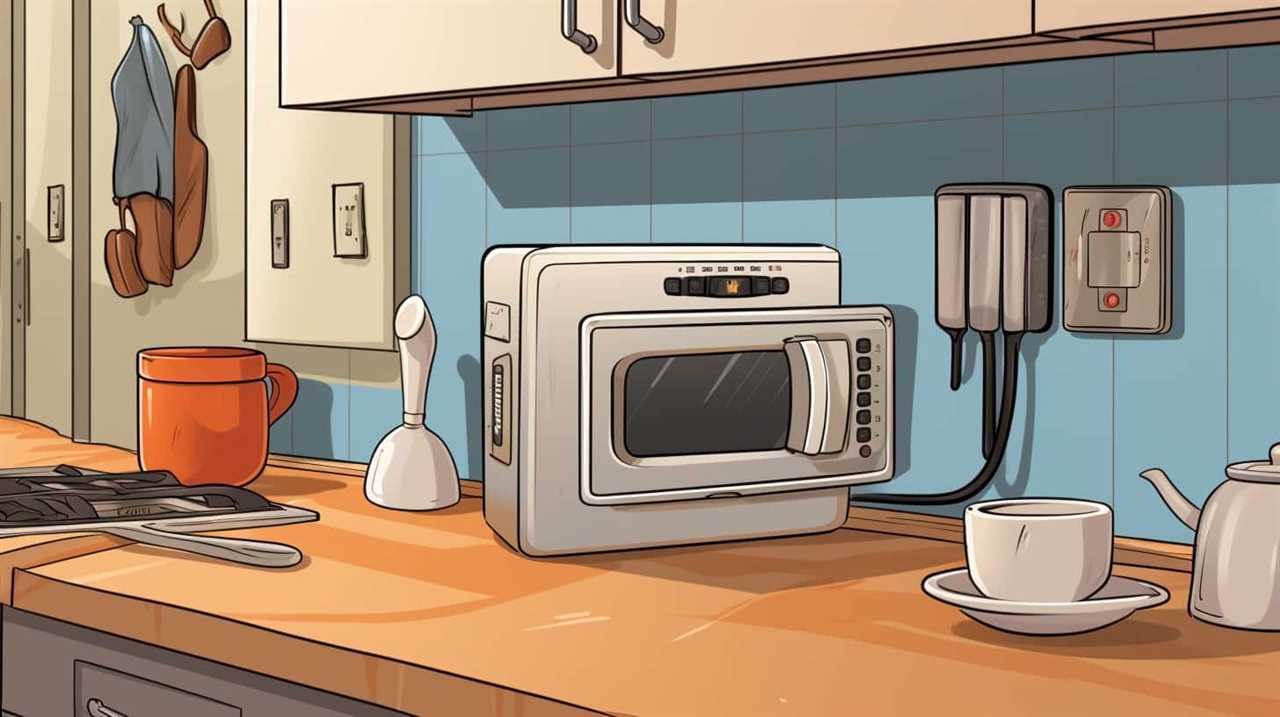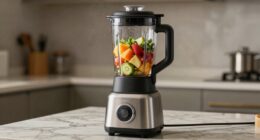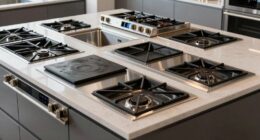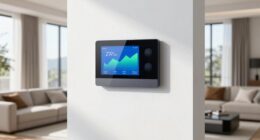Are you tired of seeing your money go to waste? We’ve all felt the frustration of watching our savings disappear, like water flowing from a leaky faucet. But don’t worry! There is a straightforward and efficient solution to prevent this financial loss: energy-efficient appliances.
In this guide, we will reveal the secrets to maximizing long-term savings with these remarkable devices. By harnessing the power of energy efficiency, you can significantly reduce your utility bills while still enjoying the modern conveniences you love.
From understanding energy ratings to upgrading to smart home technology, we will explore a variety of strategies that will help you achieve mastery in saving money and energy.
So, let’s get started on this journey towards financial security and environmental responsibility!
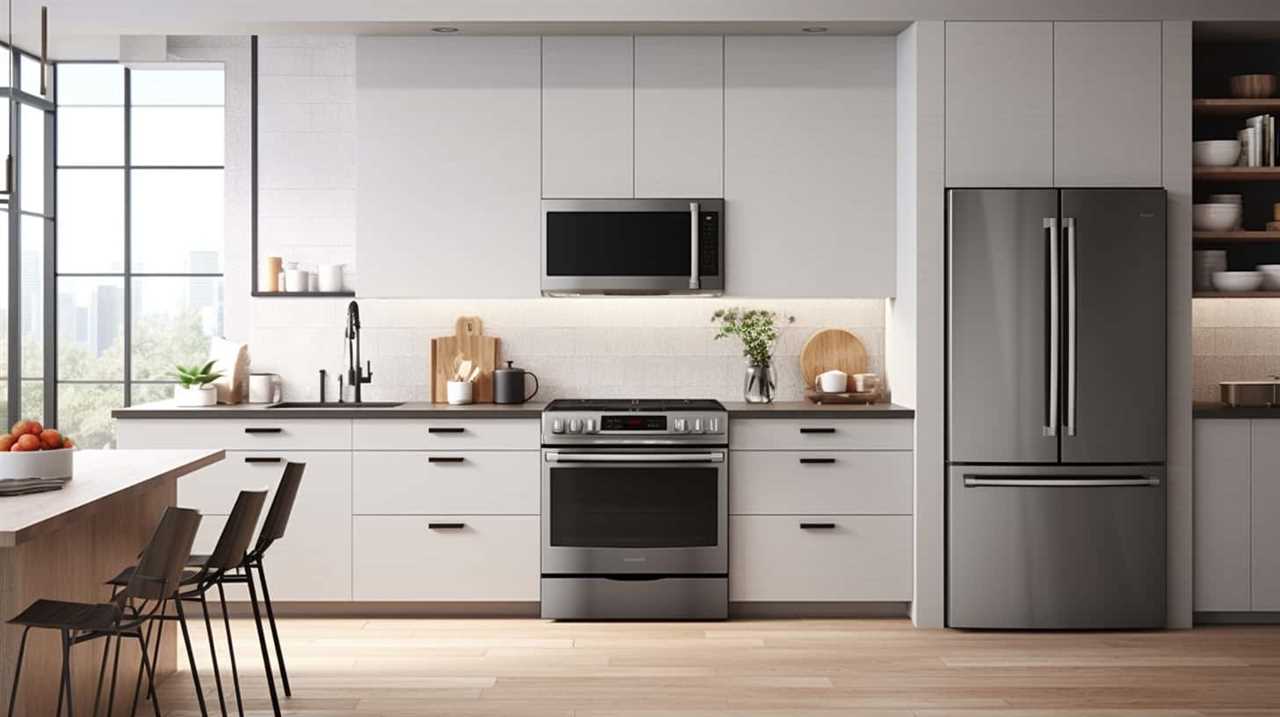
Key Takeaways
- Consider the lifetime cost of an appliance, including energy savings over time
- Choose the right size appliance for your needs to avoid excess energy usage
- Regular maintenance and cleaning improve appliance efficiency
- Upgrade to energy-efficient appliances and lighting options to maximize long-term savings
Understanding Energy Efficiency Ratings
To begin, let’s delve into the importance of understanding energy efficiency ratings when it comes to maximizing long-term savings with our appliances. Energy efficiency standards play a crucial role in helping us make informed decisions about the energy consumption of our appliances. These ratings provide us with valuable information about how efficiently an appliance uses energy, allowing us to choose models that will help us save on our energy bills in the long run.
When shopping for appliances, it’s important to look for the Energy Star label, as it indicates that the product meets or exceeds energy efficiency standards set by the Environmental Protection Agency. By choosing appliances with higher energy efficiency ratings, we can significantly reduce our energy consumption and save money on our utility bills. Additionally, it’s worth considering the lifetime cost of an appliance rather than just the upfront price. Energy-efficient appliances may have a higher initial cost, but the long-term savings in energy bills can outweigh this investment.
To further maximize our energy savings, there are a few energy-saving tips for appliances that we can follow. Firstly, we should always choose the right size appliance for our needs, as oversized appliances tend to use more energy. Secondly, regular maintenance and cleaning can improve the efficiency of our appliances. Lastly, using appliances during off-peak hours can help us take advantage of lower electricity rates.
Understanding energy efficiency ratings and implementing energy-saving tips for appliances is just the beginning of our journey towards maximizing long-term savings. In the next section, we’ll explore the importance of energy-efficient appliances and how they can contribute to significant cost savings and environmental benefits.

Importance of Energy-Efficient Appliances
Understanding energy efficiency ratings and implementing energy-saving tips for appliances are important steps towards maximizing long-term savings. However, it’s equally crucial to recognize the significance of using energy-efficient appliances in our daily lives. Energy-efficient appliances not only help us save money on our electricity bills, but they also contribute to a more sustainable future by reducing our carbon footprint.
Energy-efficient appliances are designed to consume less energy while providing the same level of performance as their conventional counterparts. By investing in these appliances, we can significantly reduce our energy consumption and lower our monthly utility bills. Moreover, energy-efficient appliances often come with innovative features and technologies that further enhance their performance and efficiency.
In addition to cost savings, using energy-efficient appliances also plays a significant role in energy-efficient home design. By choosing energy-efficient appliances, we can create a more sustainable living environment, reducing our impact on the planet. These appliances help to conserve natural resources and reduce greenhouse gas emissions, contributing to a greener and healthier planet for future generations.
Calculating Long-Term Cost Savings
Maximizing long-term cost savings with energy-efficient appliances involves accurately calculating the potential financial benefits over time. To achieve this, it’s essential to conduct a thorough energy consumption analysis and calculate the savings that can be achieved by using energy-efficient appliances.

To start, gather information about your current appliances, including their energy consumption rates and usage patterns. This data will serve as a baseline for comparison.
Next, research and select energy-efficient appliances that meet your needs. Look for models that have earned the ENERGY STAR label, as these appliances meet strict energy efficiency standards.
Once you have chosen your new appliances, calculate the potential savings by comparing their energy consumption rates with your current appliances. Consider factors such as the lifespan of the appliance, the cost of energy, and any available rebates or incentives. This will give you an estimate of the long-term cost savings that can be achieved by switching to energy-efficient appliances.
Remember to consider the energy savings over the entire lifespan of the appliance, as this will provide a more accurate picture of the financial benefits.
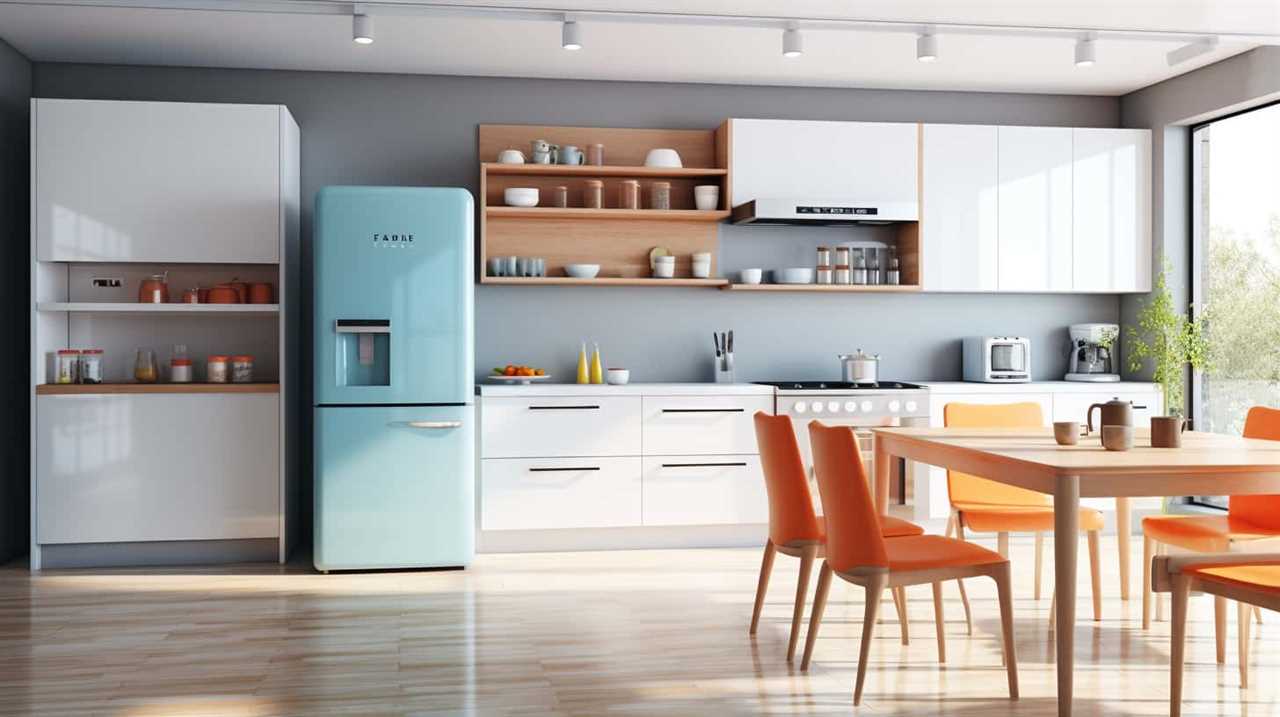
Choosing the Right Size Appliances
When considering energy-efficient appliances, we need to carefully choose the right size for our household’s needs. Proper installation and energy consumption are key factors to keep in mind when making this decision.
First and foremost, it’s important to understand that appliances that are too large for our needs consume more energy than necessary. Oversized appliances not only waste energy, but they also take up valuable space in our homes. On the other hand, undersized appliances may not meet our needs and could lead to increased energy consumption as we compensate for their limitations.
To choose the right size appliance, we should start by assessing our household’s needs. Consider factors such as the number of people in the household, typical usage patterns, and the size of the space available for the appliance. For example, a small family mightn’t require a large refrigerator, while a larger family might need a dishwasher with a higher capacity.
Once we’ve determined our needs, it’s crucial to properly install the appliance. Follow the manufacturer’s guidelines for installation, ensuring that it’s level and properly ventilated. Proper installation ensures optimal performance and energy efficiency throughout the appliance’s lifespan.

The Benefits of Smart Home Technology
What are the advantages of incorporating smart home technology into our households?
Smart home technology, also known as smart home automation, refers to the use of devices and systems that can be controlled remotely to enhance the functionality and efficiency of our homes.
Here are four benefits of integrating smart home technology:
- Energy Efficiency: Smart home automation allows us to monitor and control our energy usage through energy monitoring systems. We can easily track our energy consumption and make adjustments to reduce wastage, resulting in significant savings on our utility bills.
- Convenience: With smart home technology, we can automate various tasks and routines, such as adjusting the thermostat, turning off lights, or even starting the coffee maker. This level of convenience saves time and effort, making our lives more efficient and comfortable.
- Enhanced Security: Smart home automation provides us with advanced security features, such as smart locks, security cameras, and motion sensors. We can monitor our homes remotely, receive real-time alerts, and even control access to our property, ensuring the safety of our loved ones and belongings.
- Increased Sustainability: By integrating smart home technology, we can contribute to a more sustainable future. With energy monitoring systems, we can identify opportunities for energy conservation and make eco-friendly choices that reduce our carbon footprint.
Incorporating smart home technology into our households offers numerous advantages, from energy efficiency and convenience to enhanced security and sustainability. Now, let’s explore the next section about rebates and incentives for energy-efficient appliances, which will further maximize our long-term savings.
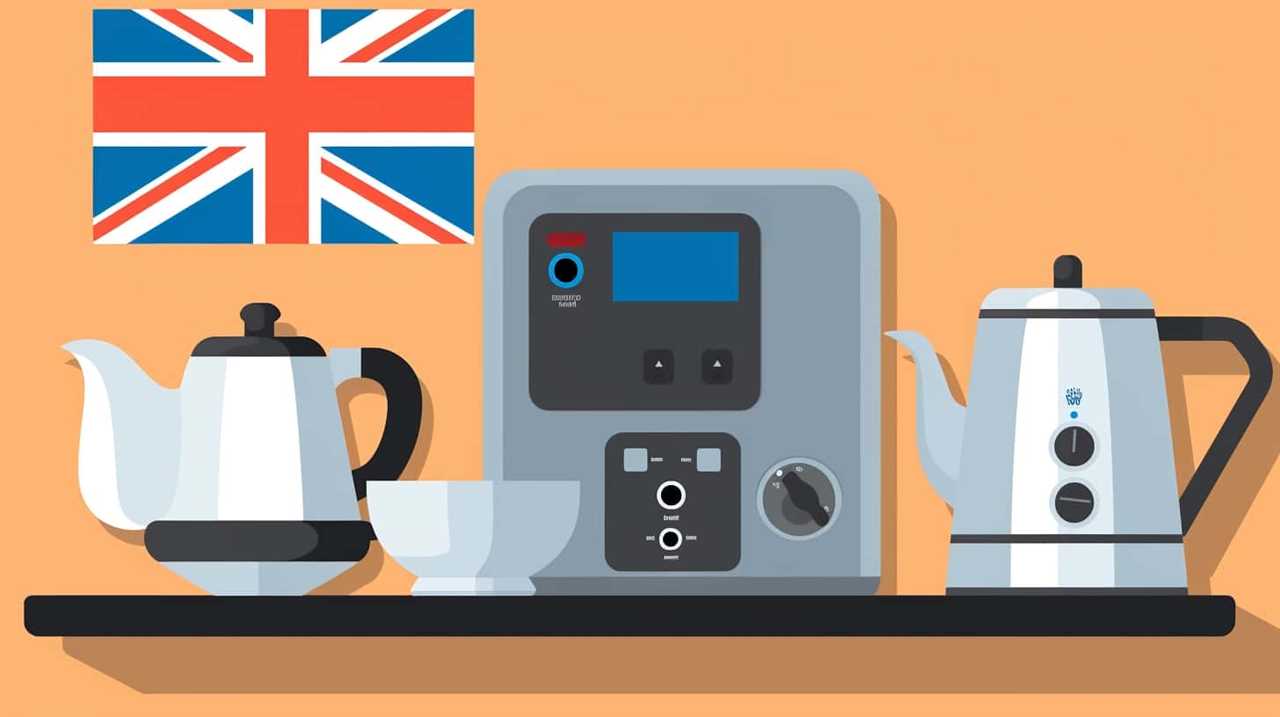
Rebates and Incentives for Energy-Efficient Appliances
We want to highlight the financial benefits of utilizing rebates and incentives when purchasing energy-efficient appliances.
These programs can provide significant savings upfront, reducing the overall cost of the appliance.
Additionally, it’s important to note that incentives vary by location, so it’s crucial to research and take advantage of any available programs in your area.
Financial Benefits of Rebates
To maximize our long-term savings with energy-efficient appliances, it’s important to take advantage of the financial benefits provided by rebates and incentives. Here are four reasons why these financial incentives can help us save money:

- Lower upfront costs: Rebates and incentives can significantly reduce the initial purchase price of energy-efficient appliances, making them more affordable and accessible.
- Energy savings: Energy-efficient appliances consume less electricity, resulting in lower utility bills over time. With rebates and incentives, we can further offset the cost of these appliances and maximize our savings.
- Tax credits: Some energy-efficient appliances qualify for tax credits, allowing us to deduct a portion of their cost from our taxes. This can result in substantial savings during tax season.
- Long-term financial benefits: By investing in energy-efficient appliances and taking advantage of rebates and incentives, we can reduce our energy consumption and save money on utility bills for years to come.
Availability of Incentives
One reason for the importance of rebates and incentives is their availability for energy-efficient appliances. These incentives can significantly reduce the upfront cost of purchasing energy-efficient appliances, making them more accessible to consumers. Many government programs offer rebates and incentives to promote the use of energy-efficient appliances and reduce overall energy consumption. To help you understand the various incentives available, here is a table outlining the eligibility criteria for some common government programs:
| Government Program | Incentive Eligibility |
|---|---|
| Energy Star | Energy Star certified appliances |
| Residential Energy Efficiency Rebate Program | Meeting specific energy efficiency requirements |
| Federal Tax Credits | Meeting specific energy efficiency requirements |
Proper Maintenance for Optimal Efficiency
To ensure optimal efficiency and longevity of your energy-efficient appliances, it’s important to prioritize proper maintenance. Here are four proper maintenance tips that won’t only help you save energy but also extend the lifespan of your appliances:
- Clean regularly: Dust and dirt can accumulate on the surfaces and vents of your appliances, making them work harder and less efficiently. Regularly clean the exteriors and remove any debris from the vents to ensure proper airflow.
- Check seals and gaskets: The seals and gaskets on your appliances, such as refrigerator doors and oven doors, can wear out over time, causing energy leaks. Inspect them regularly and replace any damaged or worn-out seals to maintain optimal efficiency.
- Schedule professional servicing: Periodically, have a professional technician inspect and service your appliances. They can identify and fix any potential issues before they become major problems, ensuring that your appliances continue to operate at peak efficiency.
- Follow manufacturer guidelines: Read and follow the manufacturer’s instructions and guidelines for maintenance. They often provide specific recommendations for cleaning, filter replacement, and other maintenance tasks, which can help maximize the efficiency and lifespan of your appliances.
By following these proper maintenance tips, you can’t only save energy but also prolong the life of your energy-efficient appliances.
Now, let’s move on to the next section, where we’ll discuss energy-saving tips specifically for refrigerators.

Energy-Saving Tips for Refrigerators
Let’s talk about some energy-saving tips for refrigerators.
Firstly, adjusting the temperature settings can greatly improve efficiency.
Regular maintenance and cleaning of the refrigerator’s coils and vents is also essential.
Additionally, investing in an energy-efficient refrigerator model can make a significant difference in long-term savings.

Temperature Settings for Efficiency
We can maximize energy efficiency in our refrigerators by adjusting the temperature settings to optimal levels. Here are four energy-saving tips for temperature control:
- Set the refrigerator temperature between 36 to 38 degrees Fahrenheit (2 to 3 degrees Celsius). This range keeps food fresh without wasting energy.
- Keep the freezer temperature at 0 degrees Fahrenheit (-18 degrees Celsius). It’s crucial to prevent food spoilage and maintain energy efficiency.
- Avoid frequently adjusting the temperature settings. Opening the refrigerator or freezer door frequently can cause the temperature to fluctuate, leading to energy waste.
- Regularly check the temperature using a thermometer. This ensures that the refrigerator is operating at the desired temperature and helps identify any malfunctions that may affect energy efficiency.
Proper Maintenance and Cleaning
Continuing with our efforts to maximize energy efficiency in our refrigerators, proper maintenance and cleaning play a crucial role in ensuring optimal performance and long-term savings. By following a few energy-saving techniques and maintenance tips, we can keep our refrigerators running efficiently and reduce our energy consumption.
Firstly, it’s important to regularly clean the condenser coils at the back or underneath the refrigerator. These coils can accumulate dust and debris, causing the refrigerator to work harder and use more energy. By vacuuming or brushing off the coils every six months, we can improve the refrigerator’s efficiency.
Secondly, we should check and replace the door gaskets if necessary. Damaged or worn-out gaskets can lead to air leaks, causing the refrigerator to work harder to maintain its temperature. By ensuring a tight seal, we can prevent energy wastage and reduce our electricity bills.

Lastly, it’s essential to defrost the freezer compartment regularly. Built-up ice can decrease the refrigerator’s efficiency and increase energy consumption. By defrosting the freezer when the ice thickness reaches around 1/4 inch, we can maintain optimal performance and save energy.
Energy-Efficient Refrigerator Models
To further optimize our energy savings, it’s important to explore energy-efficient refrigerator models and implement energy-saving tips. Here are four ways to reduce energy consumption with energy-efficient freezer models:
- Look for ENERGY STAR certified refrigerators: These models are designed to use less energy and help you save on your electricity bill. They’re also equipped with advanced features like improved insulation and temperature control.
- Choose a refrigerator with a top-mounted freezer: Top-mounted freezers are more energy-efficient compared to side-by-side or bottom-mounted freezers. This is because cold air tends to sink, making it easier to maintain the desired temperature in the refrigerator compartment.
- Opt for a smaller-sized refrigerator: The larger the refrigerator, the more energy it consumes. Assess your needs and choose a size that fits your requirements without unnecessary excess space.
- Properly maintain and clean your refrigerator: Regularly clean the coils, check the door seals for leaks, and ensure the temperature settings are optimal. This will ensure your refrigerator operates efficiently and minimizes energy waste.
Maximizing Efficiency With Washing Machines
With a focus on energy efficiency, we can optimize the performance of our washing machines. To save energy when using our dryers, we can follow some simple tips.
- First, make sure to clean the lint filter after every load. A clogged filter can impede airflow and reduce drying efficiency.
- Additionally, avoid overloading the dryer as this can prolong drying times.
Another energy-saving tip is to take advantage of the benefits of cold water washing. Most of the energy used by a washing machine goes towards heating the water.

- By washing our clothes in cold water, we can significantly reduce energy consumption.
- Cold water washing is also gentler on fabrics, helping them last longer.
Furthermore, using a high-efficiency washing machine can save even more energy.
- These machines use less water and have shorter wash cycles, resulting in reduced energy consumption.
By implementing these energy-saving tips and using efficient washing machines, we can contribute to long-term savings and reduce our environmental impact.
Now, let’s move on to the next section, which will discuss efficient cooking with induction stoves.
Efficient Cooking With Induction Stoves
Our favorite way to cook efficiently is by using induction stoves. These innovative appliances offer several benefits that make them a great choice for anyone looking to save energy and cook more efficiently. Here are four reasons why induction stoves are our top pick for energy-conscious cooking:

- Rapid heating: Induction stoves use magnetic fields to heat the cookware directly, which means they heat up much faster than traditional stovetops. This allows you to start cooking immediately and reduces the amount of time spent waiting for the stove to reach the desired temperature.
- Precise control: Induction stoves offer precise temperature control, allowing you to adjust the heat quickly and accurately. This is especially useful for delicate cooking techniques that require fine temperature adjustments, such as simmering or sautéing. With induction stoves, you can easily achieve the perfect cooking results every time.
- Energy efficiency: Induction stoves are highly energy-efficient because they only heat the cookware and the food inside it. Unlike gas or electric stovetops, there’s no wasted heat generated around the cookware. This means less energy consumption and lower utility bills.
- Safety features: Induction stoves are designed with safety in mind. They’ve built-in features such as automatic shut-off and pan detection, which help prevent accidents and reduce energy waste. Additionally, since the surface of the stove remains cool to the touch, there’s a lower risk of burns or other injuries.
Energy-Efficient Options for Dishwashers
Efficiency is also key when it comes to choosing energy-efficient options for dishwashers. Not only can these appliances save you money on your energy bills, but they also contribute to a more sustainable lifestyle. When looking for an energy-efficient dishwasher, there are a few factors to consider.
First, pay attention to the dishwasher’s Energy Star rating. Energy Star is a program that certifies appliances for their energy efficiency. Look for models that have the Energy Star label, as these dishwashers meet strict energy efficiency guidelines.
In addition to the Energy Star rating, consider the dishwasher’s water usage. Look for models that have a low water consumption per cycle. This won’t only save water but also reduce the energy required to heat up that water.
Regular dishwasher maintenance is also important in maximizing energy efficiency. Clean the filters regularly to ensure proper water flow and remove any food particles that can clog the system. Additionally, make sure the dishwasher is loaded efficiently, with dishes properly spaced to allow for optimal water and energy usage.

By choosing energy-efficient dishwasher models and practicing proper dishwasher maintenance, you can save money on your energy bills while reducing your environmental impact.
Now, let’s move on to the next section and explore the impact of energy-efficient lighting.
The Impact of Energy-Efficient Lighting
When it comes to energy-efficient lighting, there are two key points to consider: cost savings and environmental benefits.
By switching to LED lights, we can significantly reduce our energy consumption and lower our electricity bills.
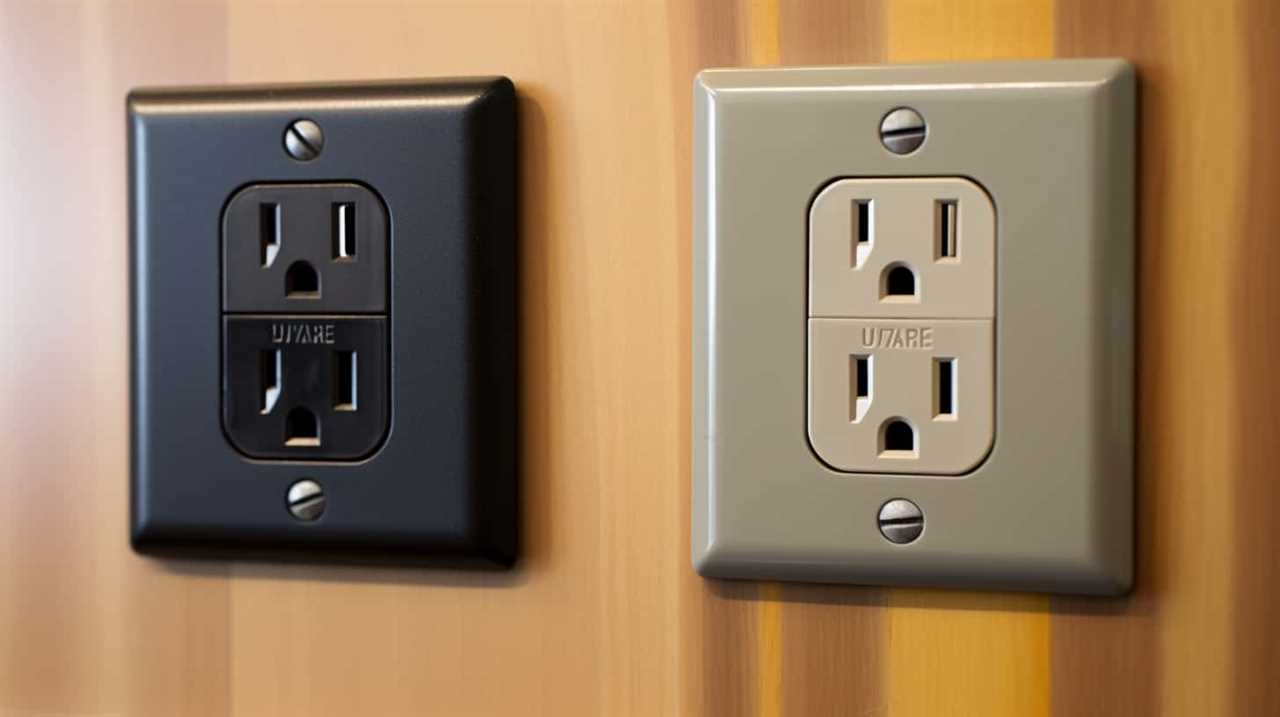
Additionally, LED lights have a longer lifespan and are more environmentally friendly, as they don’t contain hazardous materials like mercury.
Cost Savings With LEDs
By using LED lighting, we can significantly reduce our energy consumption and save money in the long run. LED lights have numerous cost benefits that make them a smart choice for energy-efficient lighting.
Here are four reasons why investing in LED lighting is a wise decision:
- Energy Efficiency: LED lights use significantly less energy compared to traditional incandescent bulbs, resulting in lower electricity bills.
- Long Lifespan: LED lights have a much longer lifespan than traditional bulbs, reducing the frequency of replacements and saving money on maintenance costs.
- Durability: LED lights are durable and resistant to shocks, vibrations, and temperature changes, making them a reliable and cost-effective lighting option.
- Reduced Heat Output: Unlike traditional bulbs, LED lights emit very little heat, which not only saves on cooling costs but also reduces the risk of fire hazards.
Environmental Benefits of Efficiency
As we continue to explore the benefits of energy-efficient appliances, it’s important to consider the positive impact that energy-efficient lighting has on the environment.
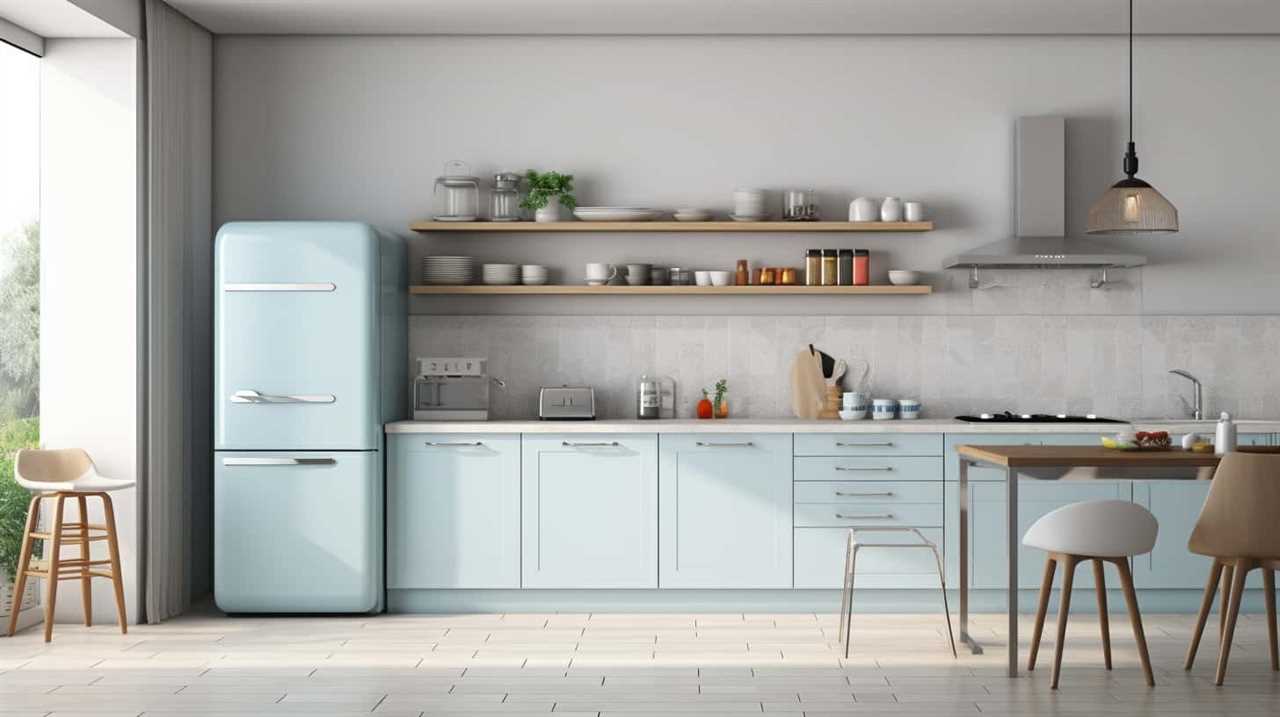
By using energy-efficient lighting, we can reduce greenhouse gas emissions and contribute to a more sustainable future. Energy-efficient lighting, such as LEDs, consume less electricity and have a longer lifespan compared to traditional incandescent bulbs. This not only reduces energy consumption but also decreases the demand for energy production, which often relies on fossil fuels.
Moreover, energy-efficient lighting can be integrated into energy efficient building materials and sustainable transportation options, further enhancing their environmental benefits. Investing in energy-efficient lighting is a simple yet effective way to minimize our carbon footprint and promote a greener, more sustainable world.
Now, let’s delve into the next section about investing in energy-efficient HVAC systems.
Investing in Energy-Efficient HVAC Systems
We highly recommend investing in energy-efficient HVAC systems to maximize long-term savings with our appliances. HVAC stands for Heating, Ventilation, and Air Conditioning, and it plays a crucial role in maintaining a comfortable and energy-efficient home or building.

Here are four reasons why investing in energy-efficient HVAC systems is a wise decision:
- Reduced energy consumption: Energy-efficient HVAC systems are designed to use less energy while still providing the same level of comfort. This can lead to significant savings on your energy bills over time.
- Environmental benefits: By reducing energy consumption, energy-efficient HVAC systems also help to lower greenhouse gas emissions, contributing to a healthier and more sustainable environment.
- Improved indoor air quality: Energy-efficient HVAC systems often come with advanced air filtration features, which can help remove allergens, pollutants, and other harmful particles from the air, leading to better indoor air quality and improved health for occupants.
- Long-term cost savings: While energy-efficient HVAC systems may have a higher upfront cost compared to conventional systems, the long-term savings in energy bills and maintenance costs can outweigh the initial investment, resulting in significant cost savings over the lifespan of the system.
Investing in energy-efficient HVAC systems is a smart choice for maximizing long-term savings while also reducing your environmental impact and improving indoor air quality.
Upgrading to Energy-Efficient Water Heaters
To maximize long-term savings, we recommend upgrading to energy-efficient water heaters that can significantly reduce energy consumption and lower utility bills. Upgrading your water heater not only helps you save money, but also reduces your environmental impact.
When it comes to water heater maintenance, it’s essential to flush the tank annually to remove sediment buildup, which can reduce the heater’s efficiency. Additionally, insulating the hot water pipes can minimize heat loss during distribution.

To further maximize energy savings, consider installing energy-saving showerheads. These showerheads use less water without compromising water pressure, allowing you to conserve both water and energy. By combining an energy-efficient water heater with an energy-saving showerhead, you can significantly reduce your household’s energy usage and costs.
When choosing an energy-efficient water heater, look for the ENERGY STAR label, as these models meet strict efficiency guidelines set by the U.S. Environmental Protection Agency. Tankless water heaters are also a great option, as they heat water on demand and eliminate the need for a storage tank, reducing standby heat loss.
Investing in an energy-efficient water heater and adopting water-saving habits can lead to substantial long-term savings while reducing your carbon footprint. So, consider making the switch today and enjoy the benefits of lower utility bills and a more sustainable lifestyle.
Long-Term Savings With Energy-Efficient Laundry Routines
What laundry habits can we adopt to maximize long-term savings with energy-efficient appliances?

Here are four energy-saving laundry tips that can help reduce energy consumption and save you money:
- Wash with cold water: Heating water accounts for a significant portion of energy usage in laundry. By switching to cold water, you can save energy and still achieve clean clothes. Modern detergents are designed to work efficiently in cold water, so your clothes will come out just as fresh.
- Use a high-efficiency washer: Energy-efficient washers use less water and energy compared to traditional models. Look for washers with the ENERGY STAR label, which indicates superior energy efficiency. These machines often have features like load-sensing technology and shorter cycle times, further reducing energy consumption.
- Optimize load size: Always aim to wash full loads, as running smaller loads wastes energy. If you need to wash a small load, adjust the water level settings accordingly. This will ensure that you’re using the appropriate amount of water and energy for each load.
- Air dry when possible: Utilize natural drying methods, such as hanging clothes on a clothesline or using a drying rack. This eliminates the need for a dryer, which is one of the most energy-consuming appliances in the home. If using a dryer is necessary, make sure to clean the lint filter regularly to maintain efficiency.
Frequently Asked Questions
Are There Any Government Programs or Incentives Available to Help Offset the Cost of Purchasing Energy-Efficient Appliances?
There are government programs and incentives available to help offset the cost of purchasing energy-efficient appliances. These programs aim to encourage individuals and businesses to choose energy-efficient options by providing financial assistance.
By taking advantage of these programs, you can save money upfront while also reducing your long-term energy costs.
It’s important to research and understand the specific programs and incentives available in your area to maximize the savings potential of energy-efficient appliances.

What Are Some Common Maintenance Tasks That Should Be Performed Regularly to Ensure Optimal Efficiency of Energy-Efficient Appliances?
Regular maintenance is essential for ensuring the optimal efficiency of energy-efficient appliances.
By performing regular maintenance tasks such as cleaning filters, checking for leaks, and inspecting electrical connections, we can maximize the performance and energy savings of our appliances.
It’s important to follow manufacturer guidelines and schedule regular maintenance appointments to keep our appliances running smoothly.
Can Using Energy-Efficient Appliances Really Make a Significant Impact on My Monthly Utility Bills?
Using energy-efficient appliances can have a significant impact on our monthly utility bills. These appliances are designed to consume less energy, which means lower electricity bills for us.
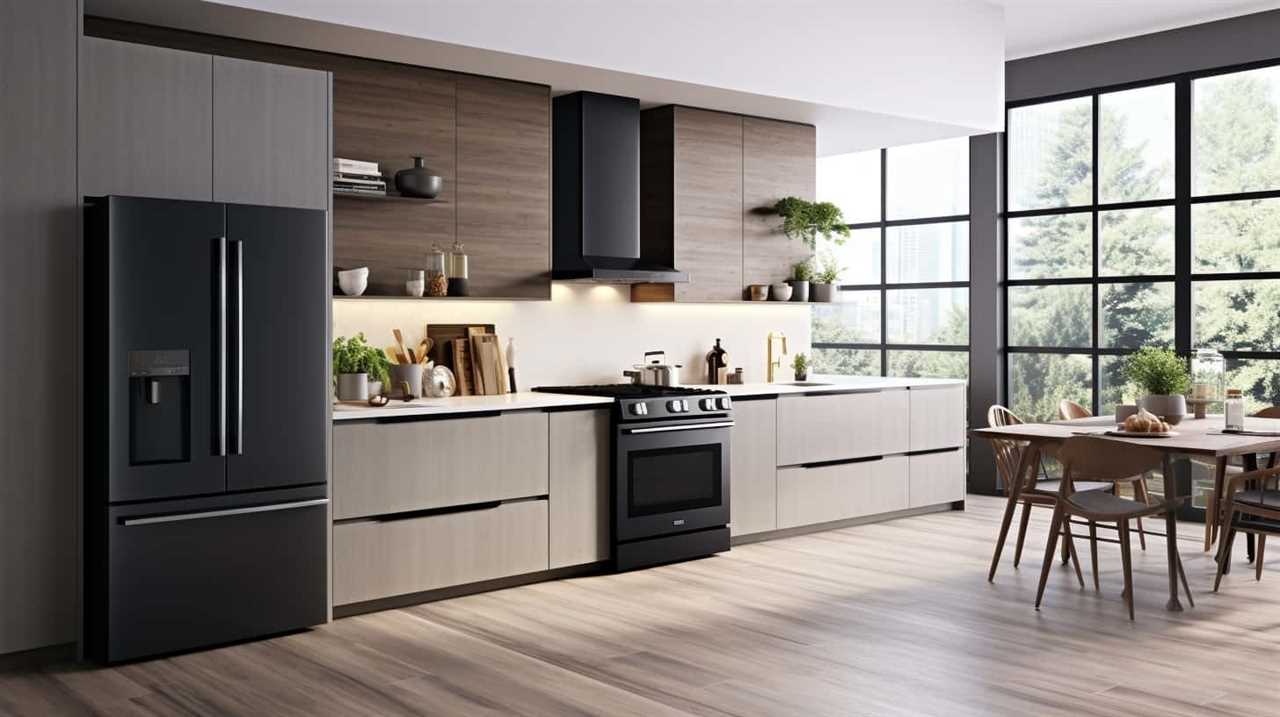
Not only do they save us money, but they also benefit the environment by reducing our carbon footprint. By choosing energy-efficient appliances, we’re actively contributing to a greener and more sustainable future.
Are There Any Specific Brands or Models of Energy-Efficient Appliances That Are Known for Their Durability and Long Lifespan?
Specific brands and models of energy-efficient appliances known for durability and long lifespan can be found through consumer reviews.
Researching brands like Bosch, Whirlpool, and LG can provide insights into their reputation for reliability.
Additionally, models such as Bosch 500 Series dishwashers and LG 4-door refrigerators have received positive feedback for their longevity.
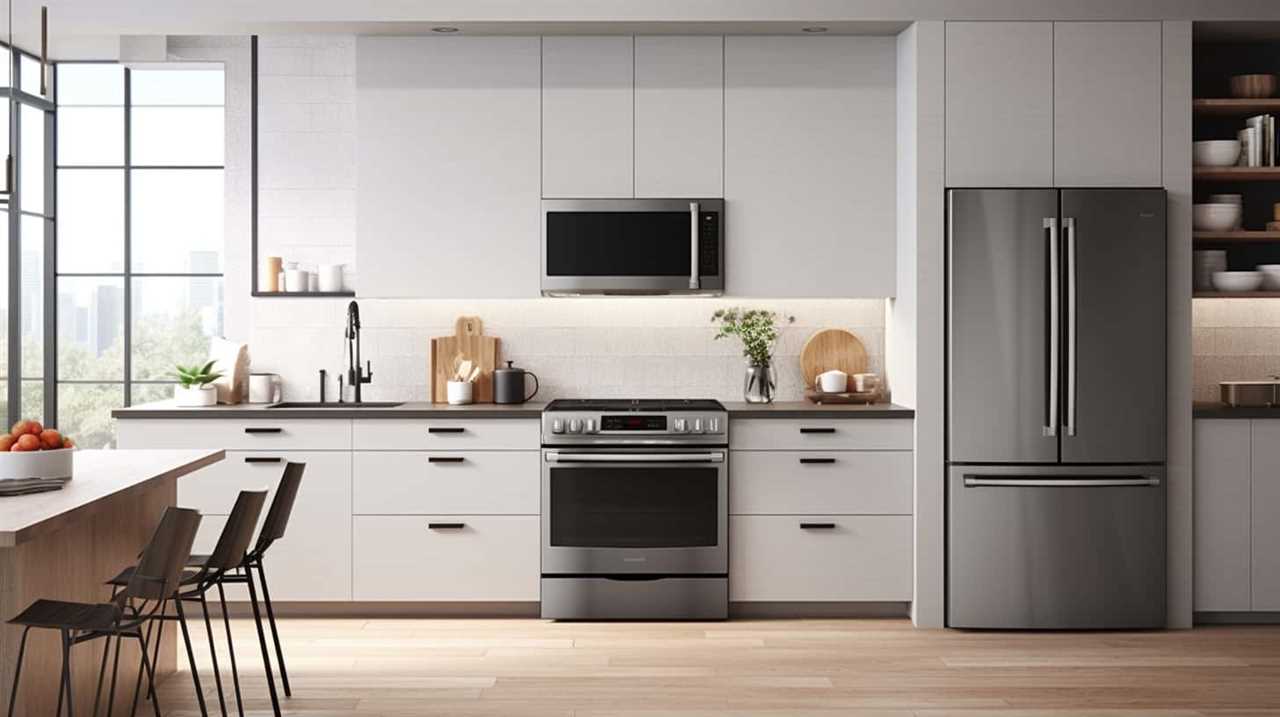
How Does the Cost of Energy-Efficient Appliances Compare to Traditional Appliances, and Is the Initial Investment Worth It in the Long Run?
When considering energy-efficient appliances versus traditional ones, the initial investment may seem higher. However, in the long run, the cost savings can be significant.
Energy-efficient appliances consume less energy, resulting in lower utility bills. This, coupled with potential tax rebates and incentives, makes the investment worthwhile.
What Are the Benefits of Using Energy-Efficient Appliances for Long-Term Savings?
Investing in energy-efficient appliances can lead to long-term savings on your energy bills. The benefits of energy efficiency appliances include lower electricity consumption, reduced environmental impact, and potentially longer lifespan of the appliance. Additionally, many energy-efficient appliances come with rebates and incentives, further increasing the savings potential.
Conclusion
In conclusion, by investing in energy-efficient appliances and making small changes to our daily routines, we can maximize long-term savings on our energy bills.
It’s time to take the bull by the horns and make smart choices that not only benefit our wallets but also the environment.
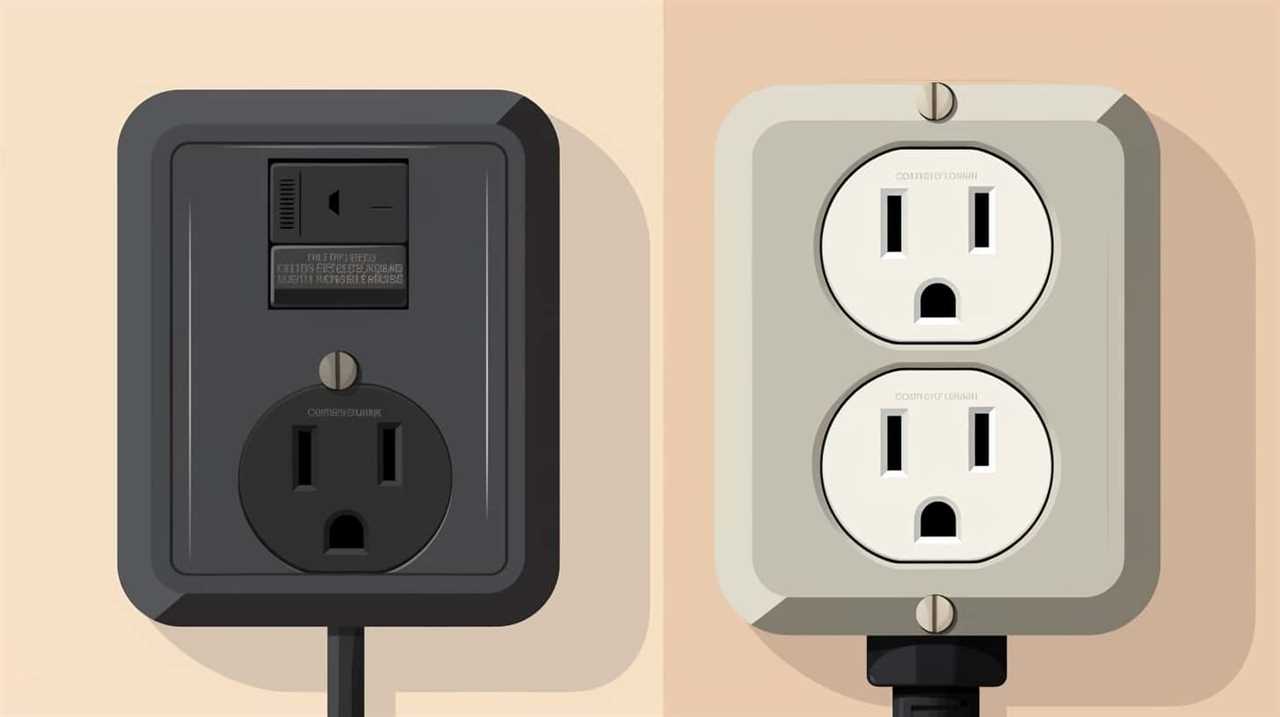
So, let’s roll up our sleeves and start reaping the fruits of our energy-saving efforts.
It’s a win-win situation that will leave us smiling all the way to the bank.
